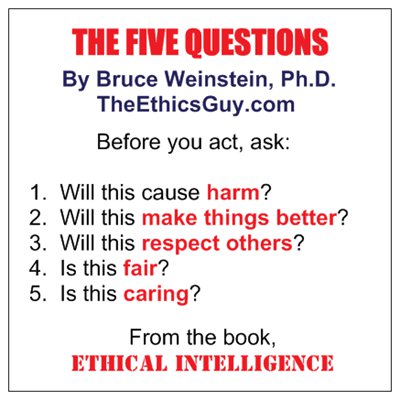
If I can’t do anything useful, at least I would like to do as little harm as possible.” From Jon Kabat-Zinn’s “Wherever You Go There You Are”.
We used to talk about the importance of IQ, then emotional quotient (EQ), but what about ethical intelligence?
Being ethically intelligent doesn’t just mean knowing what is right; it also means having the courage to do what is right. Ethical intelligence may be the most practical form of intelligence there is — and the most valuable.” Bruce Weinstein, “Ethical Intelligence: Five Principles for Untangling Your Toughest Problems at Work and Beyond”
The principles behind ethical intelligence reminds me that we are at a critical juncture, where many educational policies and decisions are not only ineffective, but are doing harm to teachers and children alike; and we need to take action.
In essence, I’m questioning the “ethical intelligence” of the decisions we are making, and worse yet, the decisions that are being made for us.
I hope, however, that this questioning allows me to take action. To be brave and establish ways to work and live with greater ethical intelligence.
In a practical way, I hope to increase our ethical intelligence-based decision-making as individuals, organizations, and systems by answering five questions before we promote, require, or implement a given practice (see image below, or click here):

Image shared with permission given by Dr. Bruce Weinstein
By asking these five questions, we can increase our ethical intelligence; and, more likely, live and work from a place where we do no harm and act with compassion.
Doing no harm and being compassionate can be traced back to one of the earliest human languages, Sanskrit (i..e, the word Ahimsa, means “not to injure” and “compassion”). Doing no harm and acting with compassion can also be found in one of the oldest oaths professionals have taken (i.e., the Hippocratic oath).
Fast forward to current times, and we can also find the themes in our very own professional organizations’ code of ethics (e.g., Division for Early Childhood, National Association for the Education of Young Children).
Speaking of professional organizations, there is one more way we can take action and increase our ethical intelligence…and that is….by applying a set of standards set for by the Council For Exceptional Children.
The CEC standards, for classifying the evidence base of our practices, represent a means of improving the outcomes of children and students with disabilities.
For those making decisions about learners with disabilities; and let’s be honest, who isn’t, we must adhere to these standards as we determine which practices to implement.
Here are a few suggestions for increasing our collective ethical intelligence…to take action so we are doing no harm and operating with compassion:
- Make sure you start with demonstrating “ahimsa” to yourself. As with all challenges, the inner work is the most difficult and the most powerful.
- Learn more about ethical (and while you are at it, emotional) intelligence, and your professional organization’s code of ethics.
- Make sure state policy makers, district/agency decision-makers, and those delivering professional development are able to speak to the CEC standards for classifying the evidence base of the practices they require or promote.
What action will you take today to increase your ethical intelligence?
Who can you share this post with to start a dialogue in your community about “doing no harm”…particularly if you live in a state that is “racing to nowhere.”
P.S. Want to learn about the back story on the CEC standards? Check out this article by Dr. Bryan Cook and colleagues:
Cook, B., Buysse, V., Klingner, J., Landrum, T., McWilliam, R.A., Tankersley, M., Y Test, D. (2015). CEC’s standards for classifying the evidence base of practices in special education. Remedial and Special Education, 36(4), 220–234.